Colgate-Palmolive Company (CL) will need to defend itself against mounting criticism for the use of the chemical triclosan in its Colgate Total toothpaste brand. Triclosan, an antibacterial agent that the company used in its brand to fight gum disease, has been linked to developmental problems and cancer-cell growth in primates.
According to the company, triclosan is safe for human use because its Total toothpaste brand was approved by the Food and Drug Administration (FDA) in 1997. The company also submitted a summary of toxicity studies on triclosan with the application, which the FDA only made public early this year after a Freedom of Information Act lawsuit was filed.
The 35-page toxicity report shows that the FDA relied on company research to assess the product’s safety for human use. The fact that the report did not cite the risks associated with the use of the chemical has raised some serious questions over the FDA’s ability to conduct due diligence when it approved the chemical 17 years ago.
The report cited fetal bone deformations in mice that were exposed to triclosan; Colgate, however, deemed those findings irrelevant as the tests were carried out on animals, not humans.
Colgate said that the safety of its Total brand was supported by over 80 studies that involved a sample size as large as 19,000 individuals, and that the company gave FDA 98 volumes to substantiate its case in support of the brand back in 1997, when the toothpaste was first approved by the agency for over-the-counter usage. Colgate also stated that the 35-page summary does not prove that triclosan is unsafe for human consumption, and that it was the FDA's decision to not put the documents on its website.
The FDA said in 1978 that there wasn’t enough data to support a ruling on triclosan. Colgate marketed its Total toothpaste outside the US in 1992 and sought approval for the first time from the regulatory body that year. The FDA said for a second time in 1994 that there wasn’t enough data to make a ruling on triclosan, which prompted the Triclosan Industry Alliance to begin a continuing dialogue with the FDA to establish the safety and efficacy of the drug. The FDA approved Colgate Palmolive’s fourth application for its Total brand in 1997.
In recent years triclosan has been removed from consumer household products. In 2011, Colgate itself removed the chemical from its brands Softsoap Antibacterial and Palmolive dish soap. Johnson & Johnson (JNJ) removed triclosan from its baby products range, and The Proctor & Gamble Company (PG) phased it out from its oral care products in 2012.
Proctor & Gamble has plans to make all of its products triclosan-free by the end of 2014. Johnson & Johnson, on the other hand, has set a 2015 deadline for itself to achieve the same goal. Unilever N.V. (ADR) (UN) also has plans to remove triclosan from its oral care products by 2017. Colgate said that the company has no plans to reformulate the toothpaste.
Read in Urdu about Colgate toothpaste and Cancer.


According to the company, triclosan is safe for human use because its Total toothpaste brand was approved by the Food and Drug Administration (FDA) in 1997. The company also submitted a summary of toxicity studies on triclosan with the application, which the FDA only made public early this year after a Freedom of Information Act lawsuit was filed.
The 35-page toxicity report shows that the FDA relied on company research to assess the product’s safety for human use. The fact that the report did not cite the risks associated with the use of the chemical has raised some serious questions over the FDA’s ability to conduct due diligence when it approved the chemical 17 years ago.
The report cited fetal bone deformations in mice that were exposed to triclosan; Colgate, however, deemed those findings irrelevant as the tests were carried out on animals, not humans.
Colgate said that the safety of its Total brand was supported by over 80 studies that involved a sample size as large as 19,000 individuals, and that the company gave FDA 98 volumes to substantiate its case in support of the brand back in 1997, when the toothpaste was first approved by the agency for over-the-counter usage. Colgate also stated that the 35-page summary does not prove that triclosan is unsafe for human consumption, and that it was the FDA's decision to not put the documents on its website.
The FDA said in 1978 that there wasn’t enough data to support a ruling on triclosan. Colgate marketed its Total toothpaste outside the US in 1992 and sought approval for the first time from the regulatory body that year. The FDA said for a second time in 1994 that there wasn’t enough data to make a ruling on triclosan, which prompted the Triclosan Industry Alliance to begin a continuing dialogue with the FDA to establish the safety and efficacy of the drug. The FDA approved Colgate Palmolive’s fourth application for its Total brand in 1997.
In recent years triclosan has been removed from consumer household products. In 2011, Colgate itself removed the chemical from its brands Softsoap Antibacterial and Palmolive dish soap. Johnson & Johnson (JNJ) removed triclosan from its baby products range, and The Proctor & Gamble Company (PG) phased it out from its oral care products in 2012.
Proctor & Gamble has plans to make all of its products triclosan-free by the end of 2014. Johnson & Johnson, on the other hand, has set a 2015 deadline for itself to achieve the same goal. Unilever N.V. (ADR) (UN) also has plans to remove triclosan from its oral care products by 2017. Colgate said that the company has no plans to reformulate the toothpaste.
Read in Urdu about Colgate toothpaste and Cancer.
کولگیٹ ٹوتھ پیسٹ اور کینسر کے بارے میں نئی تحقیق۔



 Thursday, August 14, 2014
Thursday, August 14, 2014











No comments
Post a Comment